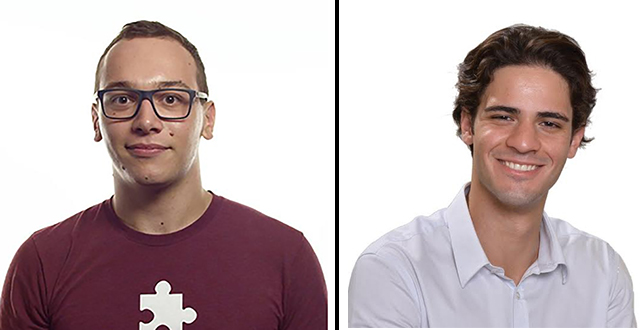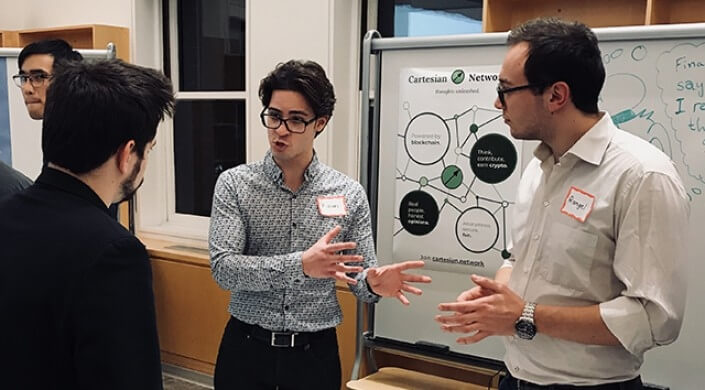News
(Left) Kaan Armagan, A.B. ’19, an economics concentrator with a secondary in computer science, and Rangel Milushev, A.B. ’19, a computer science concentrator, explain the concept behind their startup, Cartesian Network, which is a decentralized polling platform where voting happens anonymously on the blockchain. (Photo courtesy of Kaan Armagan and Rangel Milushev)
A savvy host knows that a festive gathering with family and friends can quickly morph into an ugly shouting match if the wrong conversation topics come up. Fear of social ramifications—whether a favorite uncle’s smoldering ire, the ignominy of a cherished community, or the threat of being fired—often keep the most opinionated individuals mum on divisive issues.
In fact, less than half of people in the U.S. feel comfortable speaking freely about hot-button topics like immigration, race, and gender issues, according to a recent report by the More in Common initiative.
While some things may still be off-limits around the dinner table, blockchain technology could provide an ideal way to share ideas and voice opinions, according to undergraduates at the Harvard John A. Paulson School of Engineering and Applied Sciences. Rangel Milushev, A.B. ’19, a computer science concentrator, and Kaan Armagan, A.B. ’19, an economics concentrator with a secondary in computer science, are preparing to launch Cartesian Network, a decentralized polling platform where voting happens anonymously on the blockchain.
“Quite often, even an academic environment like Harvard isn’t a place where ideas can be exchanged freely,” Armagan said. “Certain social norms prevent people from vocalizing unpopular opinions. We don’t think any idea should gain precedence over another, but we want to create an environment where ideas can be freely exchanged, and where true intellectual development can occur.”

(Left) Rangel Milushev, A.B. ’19, a computer science concentrator, and Kaan Armagan, A.B. ’19, an economics concentrator with a secondary in computer science, teamed up to launch Cartesian Network. (Photo courtesy of Rangel Milushev and Kaan Armagan)
Verified users join specific Cartesian Network communities, initially based around college campuses like Harvard and Yale, and then use their anonymous blockchain key to create polls and voice opinions within their respective community.
Users submit ideas for topics to be discussed and the community weighs in on which they’d like to take up—the most popular issues would then be opened for debate for a specified amount of time, Armagan explained.
“There are a lot of controversial issues on campus, such as final clubs closing down, some moves of the administration to remove ‘Harvard time’ and ‘shopping week,’ where it could be useful to know what people’s opinions actually are,” said Milushev.
Cartesian Network also features an incentive system to spur more engagement. Users will be rewarded in the network’s native crypotcurrency for things like the number of responses to their poll question and the relevance of evidence they present supporting their position.
That cryptocurrency could eventually be converted to dollars, giving a tangible incentive to encourage debate, Armagan said.
The co-founders also plan to create a prediction market to engage users from outside the community. Every Cartesian Network user could participate in the prediction market, buying a cryptocurrency contract with their best guess for the percentage of people who will vote “yes” or “no” to a certain poll, for instance.
But working in the volatile cryptocurrency space—which recently saw Bitcoin values plummet by more than a third in only a few days—causes more than just minor heartburn.
“It is very stressful to work with cryptocurrency,” Milushev said. “One of our biggest struggles now is thinking about timing—figuring out when will be the best time to create our coin offering. We are trying to position ourselves to start at a good point when we can take advantage of a positive market movement.”

Technical challenges still exist, too, such as ensuring that polling remains anonymous even though individuals use their public keys to vote. They also want to prevent voter fraud by making it impossible for users to verify that they voted a certain way, thwarting those who might be tempted to buy votes.
The SEAS course Startup R&D (ES 95r), taught by Paul Bottino, Executive Director of Innovation Education, has been vital as the team has weathered several major pivots. Having a community to share ideas with, and insights from entrepreneurs who have gone down this road before, has helped them overcome many challenges, Armagan said.
As Armagan and Milushev fine-tune the technology, they are preparing to launch a scaled-back version of Cartesian Network this spring. While many challenges await as they build-out the features, they are excited for the chance to help solve a complex problem that only seems to get worse, and drive different factions farther apart.
“We believe this sort of platform is the most effective way that ideas can go through a natural selection process,” Armagan said. “If people never engage with the other side of the discussion, they may never get the chance to see that their ideas may have flaws in them, that the perspective they’ve been presenting is a biased one, and that the environment they reside in is an echo chamber. The goal of Cartesian Network is to get different echo chambers to break out of their own isolation without fear of social repercussions, so we can see what ideas can really do when they engage with each other freely.”
Topics: Computer Science, Entrepreneurship
Cutting-edge science delivered direct to your inbox.
Join the Harvard SEAS mailing list.
Press Contact
Adam Zewe | 617-496-5878 | azewe@seas.harvard.edu



